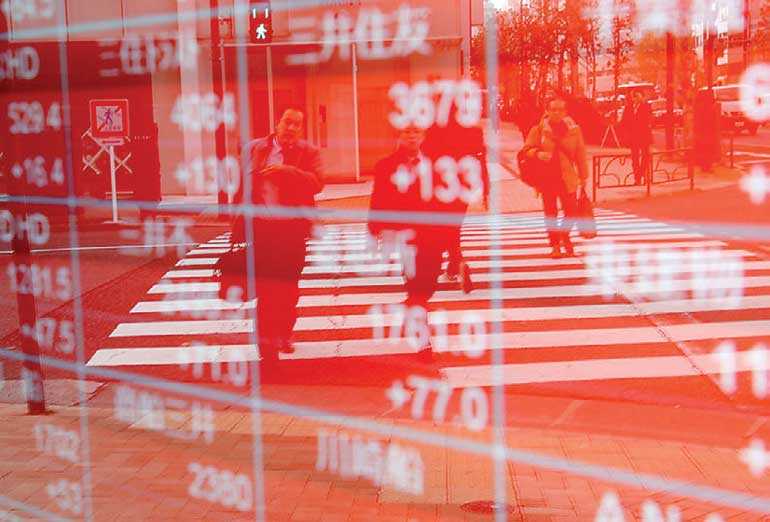Thursday Feb 26, 2026
Thursday Feb 26, 2026
Tuesday, 23 April 2019 00:00 - - {{hitsCtrl.values.hits}}

FILE PHOTO - Pedestrians are reflected on an electronic board showing stock prices outside a brokerage in Tokyo, Japan December - REUTERS
TOKYO (Reuters): Asian shares slipped yesterday, weighed down by underperforming Chinese stocks, while oil prices rallied on news the US is likely to ask all importers of Iranian oil to end their purchases or face sanctions.
Brent and US crude futures surged to nearly six-month highs on news reports that US Secretary of State Mike Pompeo will announce “that as of 2 May, the State Department will no longer grant sanctions waivers to any country that is currently importing Iranian crude or condensate.” The potential disruption to Iranian supplies are expected to add to an already tight oil market.
“The US chief Iran hawks indeed have the President’s ear as (Secretary of State) Pompeo and (National Security Advisor) Bolton are singularly focused on bringing Iran’s economy to its knees,” said SPI Asset Management trading head Stephen Innes.
“Predictably oil prices are rising,” he said.
Following the Good Friday holiday, markets in Britain, Germany and France will remain closed for Easter Monday, while those in the US will reopen.
The S&P 500 e-minis were down 0.19%.
Asian equities dipped after Chinese stocks retreated from a 13-month high as comments from top policymaking bodies raised investor fears that Beijing will slow the pace of policy easing after some signs of stabilisation in the world’s second-largest economy.
MSCI’s broadest index of Asia-Pacific shares outside Japan lost 0.3%, edging away from a nine-month peak scaled last week after Chinese economic data beat expectations and eased concerns about the health of the world economy.
The Shanghai Composite Index was down 1.3%, South Korea’s KOSPI edged down 0.2% and Japan’s Nikkei was little changed.
In currencies, the dollar index against a basket of six major currencies was a touch lower at 97.391.
The index was still within touching distance of a 1-1/2-month peak reached on Thursday after steady US retail sales data.
The euro was little changed at $ 1.1239, having taken a hit late last week after purchasing managers’ index (PMI) releases showed weak manufacturing activity in Europe.
The dollar was steady at 111.925 yen.
The Australian dollar, sensitive to shifts in risk sentiment, inched down 0.25% to $ 0.7137.
The Canadian dollar, on the other hand, added 0.25% to C$ 1.3363 thanks to a bounce in crude oil prices.
Brent crude futures were up 2.5% at $ 73.76 per barrel after brushing $ 74.31, the highest since 1 November 2018.
US crude futures climbed to $ 65.87 per barrel, highest since 31 October 2018.
The US re-imposed sanctions in November on exports of Iranian oil after President Donald Trump unilaterally pulled out of a 2015 nuclear accord between Iran and six world powers. Washington is pressuring Iran to curtail its nuclear program and stop backing militant proxies across the Middle East.
Crude extended gains from last week, when a drop in crude exports from OPEC’s de facto leader, Saudi Arabia, and a draw in US drilling rigs and oil inventories supported prices.
Spot gold was up 0.26% at $ 1,278.11 an ounce, bouncing from $ 1,270.63 in the previous session – its lowest since 27 December 2018. Gold is positively correlated to oil as the metal is often seen as a hedge against oil-led inflation.